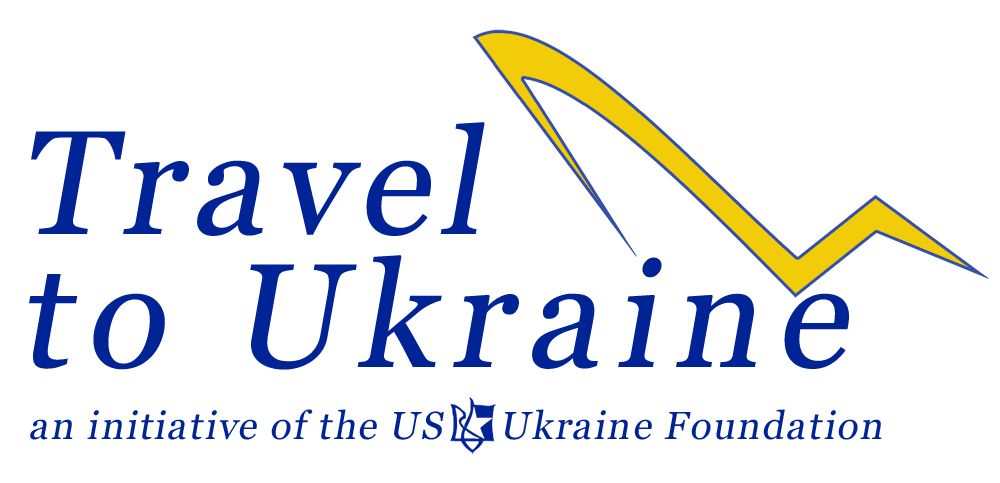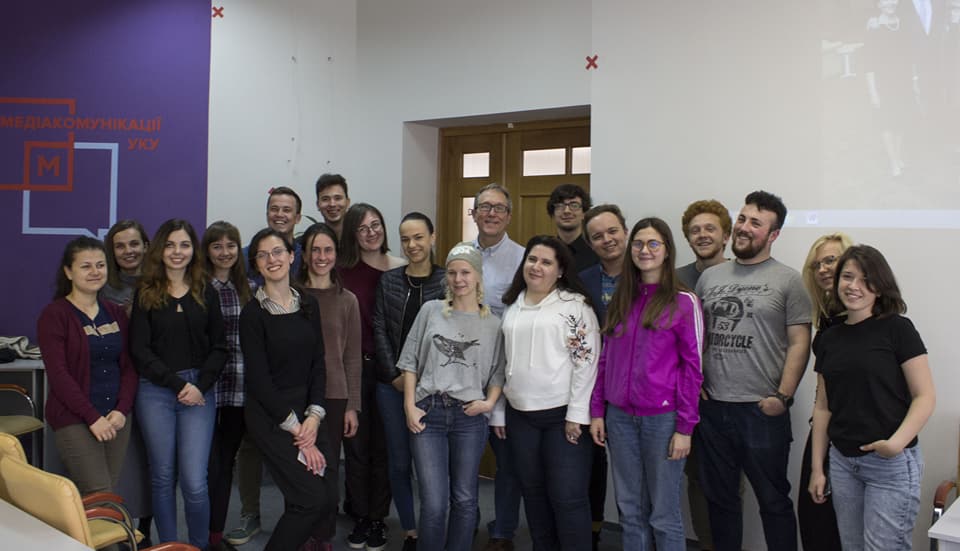Since 1989, I’ve travelled to Ukraine over three dozen times and every visit leaves me highly motivated to continue to do my small part to support Ukraine’s integration with the Euro-Atlantic community of democracies. The source of my inspiration, as always, is interacting with amazing Ukrainians, who are dedicated to transforming their country into a just, pluralistic, democratic, enlightened and prosperous society. My latest visit was no different.
I travelled to Ukraine in May in response to invitations to lecture on U.S. current affairs at two of Ukraine’s leading journalism schools–a sort of reprise of my Fall 2016 Fulbright Specialist lectures in Kyiv, Kharkiv and Lviv.
Taras Petriv, who teaches at the Institute of Journalism at Shevchenko National University in the Ukrainian capital, brought me back to update his students on the changes in U.S. politics and the work of the media since the latest American presidential election. Joining our discussion were journalism students from all over Ukraine who were participating in Professor Petriv’s Media Mobility Hub internship program. Under the auspices of his Suspilnist Foundation, Taras places journalism students from the provinces with media outlets in the capital for two weeks. Kudos to him for providing young regional journalists with a chance to gain experience covering news at the national level.
In Lviv, my host was Viktoriia Romaniuk, an editor at StopFake.org who heads the Media Communications master’s program at Ukrainian Catholic University (UCU). It was my first opportunity to lecture at UCU, an institution that is widely admired for its ethics-based approach to higher learning in Ukraine. Viktoriia is a native of the Kharkiv region and expresses a tinge of homesickness for the open spaces of northeastern Ukraine. But she is likely not the only person at UCU experiencing those feelings as many of her students hail from different parts of Ukraine, including Poltava, Sumy, Dnipro, Odesa and the Donbas.
LVIV MEDIA FORUM
My visit to western Ukraine coincided with the 6th annual Lviv Media Forum—a three-day marathon of speeches and discussions, spearheaded by UCU’s journalism school. The caliber of expertise and thoughtful deliberations about the challenges faced by journalists and news media today was stunningly impressive. One of my favorites was the talk by the Massachusetts Institute of Technology’s William Uricchio, who noted that while (online) connectivity and networking between people has experienced explosive growth, media ownership is now super concentrated, with six companies dominating the market. Another trend he cited: authoritative media (encyclopedias and the New York Times) are being supplanted by participatory media (Wikipedia and Facebook). What does this mean for the future of journalism and common knowledge?
In a discussion titled “Cinema that Forms Us: What Ukrainians Need in Cinema Halls,” I enjoyed the hopeful tone of Cyborgs director Ahtem Seitablaiev regarding the further expansion of Ukrainian moviemaking. For decades, media owners contended that Ukrainian-language movies and TV serials could not compete with programming made in Russia. Now Ukrainians have been spurred by Moscow’s’s military aggression to assert control over their airwaves and cinema theaters. I think moderator Andriy Kulikov (Hromadske radio) got it right when he stated that, of course, there are situations when popular demand dictates what is produced. But there are also situations when the movies that are produced are so compelling that they can influence the tastes of the audience. Andriy encouraged Ukrainian filmmakers to produce more movies that will shape the market in Ukraine.
Other panels that drew my attention at the Lviv Media Forum were “Local Journalism: Survival Guide,” (featuring Taras Bilka of Hromadske TV in Zaporizhia, Nataliya Kurdiukova of Nakipelo in Kharkiv, Uliana Antonyk of TRK Lviv – Suspilne, Valeria Pechenyk of dyvys.info and Oleh Onysko of Zaxid.net) and “How Can Media Resist Government Pressure?” (featuring Michael Bociurkiw, an international affairs specialist from Canada, Veronika Vichova of Kremlin Watch in Czechia, Foldes Andras of Index.hu in Hungary and Jakub Gornicki of Outriders in Poland). Both of the discussions illustrated how Ukrainian news media are working on the frontlines of Russia’s global hybrid disinformation war, while dealing with the same commercial pressures that news organizations all over the world are facing.
USUF’s Adrian Karmazyn with Taras Petriv’s Kyiv Shevchenko National University journalism students and Media Mobility Hub interns at Internews.
POLITICS AND INTERNATIONAL RELATIONS
My visit to Ukraine was also an opportunity to catch up with old friends and establish new connections with emerging leaders in various fields.
I’m grateful to the highly respected strategic communications expert Nataliya Popovych (who I first met a few months after the Maidan) for introducing me to her colleagues, Olesya Drashkaba and Svitlana Tkachenko of Uchoose, and Oleksii Makukhin of the Hybrid Warfare Analytical Group (HWAG). Both are projects of the Ukraine Crisis Media Center, where Nataliya serves as deputy chair of the board.
Olesya and Svitlana described how Uchoose—through online games as well as video clips from Ukrainian celebrities (like Serhiy Zhadan)—tries to educate and mobilize younger voters against the simplistic solutions offered by populist politicians. Populism is viewed as a potentially serious threat to the reform achievements of the Euromaidan as Ukraine prepares for presidential and parliamentary elections in 2019.
An important component of the work of the Hybrid Warfare Analytical Group (HWAG) has been to expose, catalog and analyze the anti-European narratives that Russian media present to their audiences. Oleksii Makukhin was kind enough to show me videos compiled by HWAG which demonstrate a particularly disturbing element of Moscow’s hybrid warfare. According to HWAG, “top Russian TV channels are deliberately dehumanizing average Europeans, they are depicting European (liberal) values as ‘toxic’ and they are convincing Russians that they have the right to be aggressive towards Europe and Europeans. For instance, European countries are mentioned 18 times daily in a negative context on the channels that were researched… [and t]he average ratio of negative to positive news is 85% to 15%.. Daily life in Europe is shown as very insecure, unstable and immoral.”
While in Kyiv, it was encouraging to hear from long-time foreign policy analyst Alyona Getmanchuk about her recently established New Europe Center. The mission of the center, according to her think tank’s website, is to “develop analytical research and conduct project activities in order to promote European standards and practices in Ukraine, as well as to increase support of Ukraine’s European and Euro-Atlantic prospects among opinion leaders and officials of the EU and the NATO.” As Alyona described it, the center’s efforts include trying to form a friends of Ukraine coalition in Europe not unlike the Washington-based Friends of Ukraine Network organized by the U.S.-Ukraine Foundation (USUF).
Another platform for helping Ukraine achieve its European aspirations is the Reanimation Package of Reforms, a coalition of some 80 Ukrainian NGOs and numerous experts that collaborate with the goal of accelerating positive transformations in the country. Fresh off a briefing for foreign diplomats regarding funding for public broadcasting, Olena Prokopenko, who’s in charge of RPR’s international relations, took time out from her busy schedule to pass along a message of gratitude to Ukraine’s supporters in the West, who keep Ukrainian reform and security challenges high atop the agenda of US-Ukraine and EU-Ukraine relations. Olena recently co-authored an article on the difficulties surrounding legalization of farmland sales in Ukraine.
BUSINESS AND ECONOMIC DEVELOPMENT
The U.S.-Ukraine Foundation continues to explore ways to support and bolster Ukraine’s small and medium business sector in such fields as IT, Biotech and tourism.
We’ve all heard about Ukraine’s booming internet technology industry. A recent addition to the Kyiv IT scene is the 1991 Civic Tech Center, led by Denis Gursky. Its mission is to “inspire civic tech startups and [the] community with location, space, connections, accelerations program, events, and each other.” Denys and his tech center are every bit as impressive as Melinda Haring described in her recent Atlantic Council profile article. Denys told me that he’s on the verge of embarking on serious outreach efforts in the USA, so do try and catch up with him, if you are interested in tech startups in Ukraine.
As USUF continues to develop its Biotechnology Initiative, it’s encouraging to see that two up-and-coming researchers in the Biotech field, who were organizers of last year’s attention-grabbing Integrative Biology and Medicine conference in Kyiv, are not resting on their laurels. Veronika Gurianova of the Bogomolets Institute of Physiology and Alina Frolova of the Institute of Molecular Biology and Genetics will be holding a conference on Single-cell RNA Biology and Organoids this fall. Over a lunch of Georgian khachapuri in the Podil district of the Ukrainian capital, they shared their hopes, regarding the creation someday of a bioinformatics and biotech hub in Ukraine.
Besides achieving success in cutting-edge fields, many observers believe that the backbone of Ukraine’s future prosperity will be a thriving small business sector. The Lviv-based Business Community Club (BCC) is working toward that goal. It is a national association of small businesses, which currently represents the interests of about 1400 members in western Ukraine, Kyiv and Kharkiv. At Celentano’s on Ploshcha Rynok (possibly the best pizzeria in Lviv), Mykola Savulyak, who heads BCC, was upbeat about the networking, training and advocacy support that his organization provides to its members. He explained that the association is expanding to include medium-size businesses and has its sights on also establishing offices in Dnipro and Odesa.
A sunny day in May in Kyiv’s increasingly pedestrian-friendly Podil district.
For the past two years, the city of Kyiv tourism department has accepted USUF’s invitation to participate in the Foundation’s Ukraine booth at the New York Times Travel Show. Joining us for the show in January of 2018 was Iryna Dudynska, a senior manager from the capital’s tourism office. During my visit in May, Iryna was my tour guide of the pedestrian-friendly Podil district, which now features a huge ferris wheel, barbeque stands, picnic tables and a delightful promenade along the Dnipro River. Meanwhile, Halyna Malets, who heads up Lviv’s tourism bureau, says she expects that “Lion city” will again be participating in the NYT travel show next year. And as you are heading home from your next visit to Lviv, you may very well bump into the cheerful airport director Tetyana Romanovska, as I did. With one-million passengers having passed through the airport last year, she has plenty to smile about. Could direct flights between Lviv and the USA be in the works?
So whether you get a thrill from hugging trees in the Carpathians, engaging in a business project, lending a helping hand to a non-profit or debating Ukrainian politics—PLEASE DO TRAVEL TO UKRAINE! The country’s emerging leaders never fail to inspire and you’ll likely discover that their “can do” spirit will leave you feeling pretty darn good about the future and your own efforts in making the world a better place.
Adrian Karmazyn is a Special Advisor for Strategic Communications and Development at the U.S.-Ukraine Foundation. He previously had a 27-year career at the Voice of America, where he served as Ukrainian Service Chief from 2005 to 2015.
Photo at top of page: Adrian Karmazyn at the conclusion of his guest lecture on U.S. current affairs with Viktoriia Romaniuk’s Media Communications program students at Ukrainian Catholic University in Lviv. (Credit: Alina Zhurbenko).

